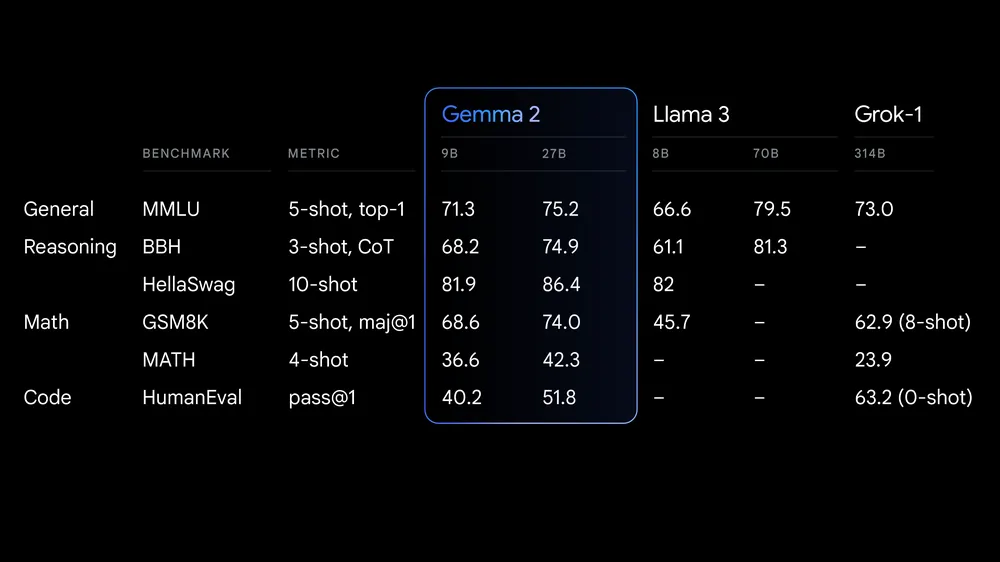
Introducing Gemma: Powerful Open-Source Language Models
Gemma is a family of advanced language models developed by Google, designed to excel at a wide range of text-based tasks, from answering questions to generating creative content. This blog post introduces the Gemma models in simple terms, explaining their capabilities, workings, and how to get started with them.
What Are Gemma Models?
Gemma models are large language models trained on massive amounts of text data to learn patterns in human language, enabling them to understand and generate human-like text. The Gemma models come in various sizes, with the 9 billion parameter and 27 billion parameter versions being the most powerful. These models are "open," meaning their underlying code and trained weights are publicly available for anyone to use and build upon, making them accessible to researchers, developers, and hobbyists.
How Do Gemma Models Work?
Gemma models are trained using a technique called "text-to-text" learning. This approach means they take in text as input and generate new text as output. For instance, you could give the model a prompt like "Write me a poem about machine learning," and it would generate an original poem in response.
The models were trained on a diverse range of text data, including web pages, books, code, and even mathematical content. This broad training allows Gemma to understand and generate text across various domains.
Key Capabilities and Use Cases
- Content Creation: Generate text such as stories, articles, marketing copy, and code.
- Chatbots and Assistants: Power conversational AI applications.
- Summarization: Provide concise summaries of long documents.
- Research and Education: Assist with NLP research and language learning.
Gemma models are designed to be lightweight and efficient, capable of running on a laptop or desktop computer, making them accessible for a wide range of applications.
Limitations and Ethical Considerations
- Biases: The models may reflect biases present in their training data.
- Factual Accuracy: They can generate incorrect or outdated factual information.
- Nuance and Context: They may struggle with subtle language, sarcasm, and complex reasoning.
There are also important ethical considerations around the use of large language models. Google has put significant effort into evaluating Gemma for safety, fairness, and responsible development. However, users should exercise caution and adhere to best practices when deploying these models.
Performance Evaluation
 Source
Source
Gemma models have undergone extensive evaluation using a variety of benchmarks and metrics, including:
- MMLU: Multi-Task Language Understanding
- HellaSwag: Commonsense reasoning
- PIQA: Physical Interaction QA
- SocialIQA: Social Interaction QA
- BoolQ: Boolean question answering
- WinoGrande: Coreference resolution
- ARC: Science question answering
- TriviaQA: Open-domain QA
- Natural Questions: Open-domain QA
- HumanEval: Code generation
- MBPP: Multiline Python code generation
- GSM8K: Grade school math word problems
- MATH: Math word problems
- AGIEval: Reasoning about abstract concepts
- BIG-Bench: Broad set of tasks
The models have demonstrated strong performance across these benchmarks, showcasing their versatility and robustness.
Getting Started with Gemma
Gemma models are available for anyone to download and use. You can find the code and pre-trained weights on platforms like Kaggle and Google's Vertex AI Model Garden. Detailed tutorials and resources are also available to help you get started.
Whether you're a researcher, developer, or just curious about the latest in language AI, Gemma is an exciting open-source project worth exploring. With its powerful capabilities and commitment to responsible development, Gemma represents the future of accessible, high-performance language models.
FAQs
- What is the Gemma language model? Gemma is a family of advanced open-source language models developed by Google. These models are designed to excel at a wide range of text-based tasks, from answering questions to generating creative content.
- Who developed the Gemma models? The Gemma models were developed by Google.
- What are the key capabilities of Gemma models? Gemma models can generate content such as stories, articles, marketing copy, and code; power chatbots and conversational AI applications; provide concise summaries of long documents; and assist with NLP research and language learning.
- How do Gemma models work? Gemma models use a technique called "text-to-text" learning. They take in text as input and generate new text as output. They were trained on diverse text data, enabling them to understand and generate text across various domains.
- What sizes do Gemma models come in? Gemma models come in various sizes, with the 9 billion parameter and 27 billion parameter versions being the most powerful.
- Where can I download the Gemma models? You can download Gemma models from platforms like Kaggle and Google's Vertex AI Model Garden.
- What are some common use cases for Gemma models? Common use cases include content creation, powering chatbots and conversational AI, summarization of long documents, and assisting with NLP research and language learning.
- What are the limitations of Gemma models? Gemma models may reflect biases present in their training data, can generate incorrect or outdated factual information, and may struggle with subtle language, sarcasm, and complex reasoning.
- What benchmarks are used to evaluate Gemma models? Benchmarks include MMLU, HellaSwag, PIQA, SocialIQA, BoolQ, WinoGrande, ARC, TriviaQA, Natural Questions, HumanEval, MBPP, GSM8K, MATH, AGIEval, and BIG-Bench.
- How can I get started with Gemma models? To get started with Gemma models, you can download the code and pre-trained weights from platforms like Kaggle and Google's Vertex AI Model Garden. Detailed tutorials and resources are available to help you begin using these models.
References
- Google AI. (n.d.). Gemma. https://ai.google.dev/gemma
- Gemma Team. (2024, February 21). Gemma on Kaggle. https://www.kaggle.com/getting-started/492749
- Bolukbasi, T., Chang, K.-W., Zhao, J., Li, M., & Tetreault, J. (2019). Quantifying and mitigating bias in text generation models. In Proceedings of the Conference on Fairness, Accountability, and Transparency (pp. 327–337). https://aclanthology.org/2023.eacl-main.9.pdf
- Hewlett, J., Laurenzano, M., Liu, L., Manning, C. D., & Seeger, M. (2023). Towards responsible large language models: Foundations, risks, and mitigation. arXiv preprint arXiv:2301.12225. https://arxiv.org/abs/2307.05782




